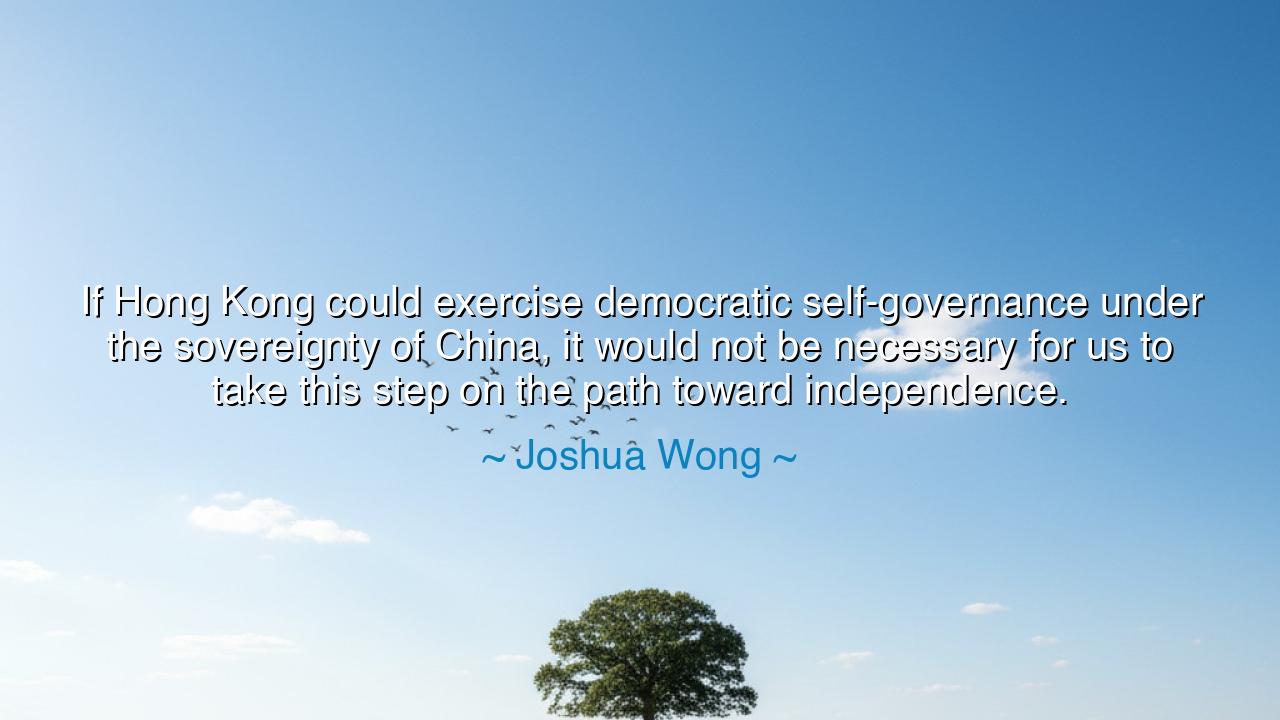
If Hong Kong could exercise democratic self-governance under the
If Hong Kong could exercise democratic self-governance under the sovereignty of China, it would not be necessary for us to take this step on the path toward independence.






Hear now the words of Joshua Wong, a voice born not from the halls of power but from the crowded streets where courage breathes: “If Hong Kong could exercise democratic self-governance under the sovereignty of China, it would not be necessary for us to take this step on the path toward independence.” These are not words of defiance for defiance’s sake, but a lament of necessity — the cry of a generation torn between loyalty and liberty. In this statement lies the eternal tension between authority and autonomy, between the rule of empire and the yearning of the human spirit to shape its own destiny.
The ancients would have heard in his voice an echo of every people who have stood at the crossroads of freedom and obedience. Wong speaks as one standing on the edge of two worlds: one promising unity, the other demanding submission. His lament reveals a deeper truth — that the desire for independence is not born of rebellion, but of the slow suffocation of self-rule. When the right to govern oneself is denied, even the most loyal heart begins to turn toward separation. Thus, self-governance is not only a political idea but a sacred need, as vital to the soul of a people as breath is to the body.
History is rich with such moments. Consider India under the British crown — a land that asked first for reform, not revolt; for equality, not exile. Men like Gandhi sought partnership within the empire, believing coexistence was possible under justice. Yet when every petition was met with silence and every plea with chains, independence ceased to be a dream and became a duty. So too, Joshua Wong’s words remind us: when promises of autonomy are hollow, independence becomes not the act of destruction, but of survival.
The story of Hong Kong, like that of so many nations before, is one of awakening. It was promised “one country, two systems,” a balance of sovereignty and liberty. Yet as the years passed, that balance tilted, and the promise waned. Wong’s words carry the ache of betrayal — the realization that the bridge of trust has crumbled. He speaks not with hatred, but with grief; for no child wishes to leave a parent unless the home becomes unlivable. In his call, we hear not rebellion’s roar, but justice’s whisper: “Let us govern ourselves, and we will not seek to part.”
To the wise, this moment is more than a tale of one city. It is the timeless lesson of power and restraint. Empires fall not only from invasion, but from the failure to grant dignity to those they govern. When rulers mistake control for unity, they plant the seeds of division. When they deny the governed their voice, they awaken the storm they sought to suppress. For the will of a free people cannot be extinguished — it may sleep under oppression, but it will always rise with the dawn.
Let this be a warning to all who hold power: the flame of democracy cannot be smothered by decree. It must be nurtured, or it will burn through its bonds. And let it also be a reminder to all citizens — that freedom is not given once and forever, but must be guarded with vigilance and understanding. To rule oneself is not an easy gift; it demands discipline, courage, and the wisdom to govern justly. Self-governance is not an act of separation alone, but of moral maturity.
Therefore, O listener, take this lesson into your heart: seek not independence out of hatred, but out of the desire to preserve truth and dignity. Question authority not for glory, but for justice. And remember, as Joshua Wong teaches, that if rulers honored their people’s right to govern themselves, the cry for separation would never arise. The truest peace is not enforced by might, but earned by mutual respect.
So let his words ring through time like a bell in fog: that freedom, once denied, will always find its voice. The path toward independence is not the birth of division, but the rebirth of identity. And though the journey be long and the night uncertain, those who walk it with integrity carry the torch of every generation that has ever yearned to live — not as subjects, but as citizens of their own making.






AAdministratorAdministrator
Welcome, honored guests. Please leave a comment, we will respond soon